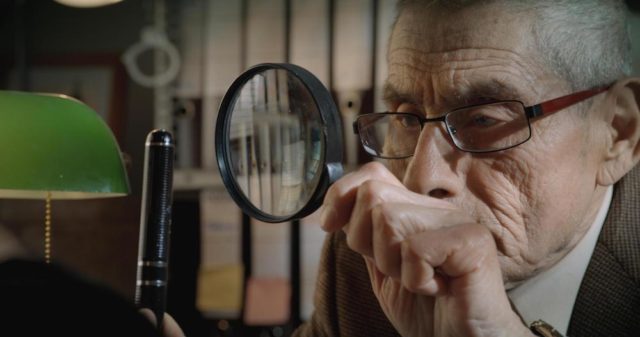‘The Mole Agent’ (Maite Alberdi, Chile, 2020), in UK cinemas and on-demand form Friday 11th December 2020, distributed by Dogwoof
Khalid Ali’s selection for the best documentary film in 2020
Documentary film is a genre that a regular film viewer might find difficult to enjoy on a Saturday film-night out. Maite Alberdi challenges those prejudices against documentary cinema by saying: ‘’I wanted to make a documentary about a private detective, a character usually reserved for fiction. I worked for a few months as an assistant to a private detective, and I realized that detectives worked on cases where distrust was widespread in relationships. I was interested in filming the elderly because they’re a group that allows us to build both universal and individual stories. Universal because we can all relate to different aspects of the story, and individual because the subjects whose stories are being told are affected by their age and unique experiences.’’
In the opening scenes, we read an intriguing advert in a local newspaper from a private detective agency seeking an 80-90 years old man for a 3-months job in a care home. A humourous montage of older men interviewing for the job sets the film tone combining poignancy and deep insight into the colourful lives of octogenarians. Struggles with digital technology and impaired memory are a few problems these men face. However; such challenges will not stop one of them, Sergio from embarking on a new mission as an ‘undercover spy’ in a retirement home investigating their quality of care on behalf of the daughter of an older woman resident in that home. Sergio is offered the job as a ‘mole agent’ after some serious training on how to secretly film the home routines and send coded messages to his private detective employer. Sergio relishes the role of a retired ‘James Bond’ with gusto and empathy. He wastes no time in befriending the mostly female residents swiftly earning their trust and love.

Alberdi describes the process of filming: ‘’The production team got filming authorization inside the nursing home, saying that we wanted to make a documentary about the elderly and shoot absolutely everything that happened there — the good and the bad with staff and residents. We also said that if a new resident arrived, we would be interested in focusing on them. They didn’t know it was a spy movie, but we would record and show everything that happened there, and they were willing’’
Through the film, we are introduced to several characters: the pious resilient woman who is self-sufficient, values her autonomy and accepts a late-life heart break, the accomplished poet forgiving of her neglectful children, the woman living with dementia waiting for her mother’s visit to flee the care home and the vibrant care manager always keen to support her residents.
Underneath the humourous tone, serious ethical and moral questions are asked: Is it right for care staff to call a woman living with dementia, and pretend to be her mother? Is it humane to lock doors and deprive residents of their liberties for the sake of their safety?
Similar to the scrutiny of the Care Quality Commission (CQC) of care homes in the UK, and their five lines of enquiry whether a care home is ‘safe, caring, responsive to needs, effective and well-led’, Sergio infiltrates the home tasked with those questions, and armed with his secret mobile phone and a desire for adventure. As a modern-day older undercover spy, Sergio has a duty to support his kin in facing their biggest foes; frailty, dependency, and loneliness.
Peer support and relationships are key factors contributing to the well-being of residents- sharing meals, exercise classes and hobbies, reminiscing on old times as well as lamenting disappointments in family members who never visit.
The film acknowledges the heterogeneity of older people; we see bed-bound people as well as physically and cognitively able ones. A ‘one size fits all’ approach cannot provide for the needs of all residents. Physical dependency comes with frustration, feeling of burdensome, and depression, all posing extremely challenging situations to staff who subsequently become physically and mentally exhausted. Caring for older people must also pay considerable attention to their carers.
Everyday incidents in a care home signify a lot; a woman labelling her clothes so that they don’t get taken by another resident shows how much older people value their dignity and identity, and as such losing a garment is not a trivial matter. Their demand for respect and personalised care is a ‘right’ that should not be seen as ‘charity from their carers’.
There are several aspects of high-quality care that the film highlights such as empowering residents to be involved in their own care as well as involving their family members in delivering compassionate care. Outdoor pleasurable activities such as joining a carnival, and regular indoor parties all contribute to ‘ageing well’.
On the personal impact of the film on her, Alberdi adds: ‘’Sergio teaches you not to judge, to be open to experiences, to create your own challenges, and not to set limits, even when you are 85 years old. He is willing to live a new life, meet new people, and listen. Sergio taught me to be open to experience without prejudice.’’